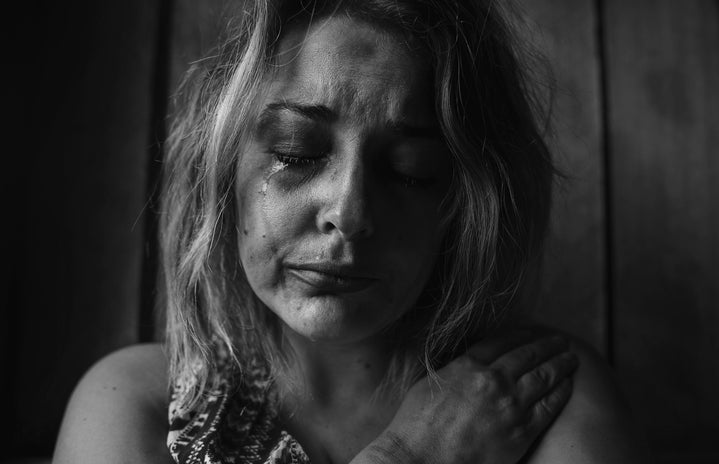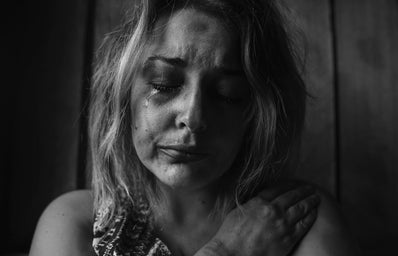TRIGGER WARNING: This article contains details of domestic abuse, assault, and battery. Names and identifying details have been altered to protect the safety of the individuals.
Domestic violence is a consistent plague that lures over the world. It doesn’t discriminate based on sex, race, religion, age or background. According to the Office for National Statistics, in the United Kingdom alone, almost 1 in 3 women will experience domestic abuse in their lifetime. Furthermore, statistics for the year ending March 2018 also showed that 33% of female homicide victims were killed by their partner or ex-partner. While this was the lowest statistic for 40 years, we are now suffering through a pandemic that isolates women with their abusers. In April 2020, the domestic violence organization Women’s Aid published their Survivor Survey to support that the Covid-19 lockdown has negatively impacted women currently experiencing domestic abuse. According to the results, 67% of women said that their abuse had worsened during the pandemic, and 72% said the pandemic has allowed their abuser to become more controlling.
If the average person were to do a quick Google search for domestic violence, they would be met with an array of articles about where to get help alongside horrific reports of women who have lost their lives to the violent hands of abuse. More often than not, many of these reports are about women who are middle-aged and married with kids. While each person’s domestic violence experience is valid, we rarely hear about students who may also be suffering. In 2018, the ONS statistics presented an alarming fact: young women aged between 16-24 were shown to be at the highest risk of experiencing domestic abuse. Despite this revelation, the amount of information you can find regarding abuse on university campuses is abysmal – but why is this the case? I interviewed Amy, a third-year student at the University of Brighton, to see if she could provide an answer.
During Amy’s first year at the University of Brighton, she entered a relationship with a man she deemed the male version of the typical girl next door trope. He appeared to be sweet, attentive, and unlike anyone that she had ever met before – but under the surface, he hid a Dr Jekyll and Mr Hyde like side to himself that Amy was yet to meet. When Amy described the abuse to me, she said: “I don’t believe it’s as black and white as people perceive it. A lot of young women have the idea that unless he hits you, anything else isn’t deemed as abuse. In reality though, abuse is a spectrum that can range from physical to emotional”. What started as controlling behaviour, such as telling her what she could and couldn’t do, ended up becoming a lot more physical during her second year when they decided to rent a flat together. This ultimately became the breaking point for Amy, but she felt as though her options to get help were slim to none due to being stuck with him constantly. Upon describing this experience, Amy said: “I always associated domestic violence as something that families go through, not boyfriend and girlfriends. I felt like if I reached out to the police, I wouldn’t have been taken seriously. I felt lost, and as though I had no other options”. This fear didn’t just affect her ability to call the police; it also acted as the reason she did not reach out to close friends, family, and the university sooner. However, as she progressed through her second year, Amy felt that enough was enough – she needed help. The only place she could get away from her abuser without needing to come up with an excuse was when she would go into university, where she made the brave decision to speak to her personal tutor. To her surprise, doing so enabled her to be provided with full support. She received contact information for local support groups, counselling from the university, and gained the courage to report her abuser to the police.
While Amy’s story had a happy ending, this isn’t the case for everyone. There are still women across the U.K. suffering every day from abuse, with Amy firmly believing that hundreds of students live in fear of speaking out in case they are not taken seriously. Whilst the university proved to be a huge help to Amy, she believes if there were better education on domestic violence provided to students, then the reports of it would be much higher. Additionally, fears of reaching out will only be amplified during the pandemic, with current Covid-19 restrictions making it seem impossible to have a safe place to escape to. Unlike Amy, who was able to walk onto campus and get help, many students are unable to do so or go to the comfort of their families instead. This lack of room for communication or support for abuse victims makes conversations on domestic violence more important now than ever. If you or anyone you know is currently suffering from domestic abuse, Women’s Aid has created a Covid-19 Resource Hub for survivors that can be accessed 24/7, which you can find by clicking HERE.
Additionally, if you are in immediate danger, please dial 999 to get an officer out immediately. If you are in a situation where you are unable to speak, use the Silent Solution service when calling 999 by pressing 55 when prompted on your mobile phone. More information on the Silent Solution service can be found HERE.


